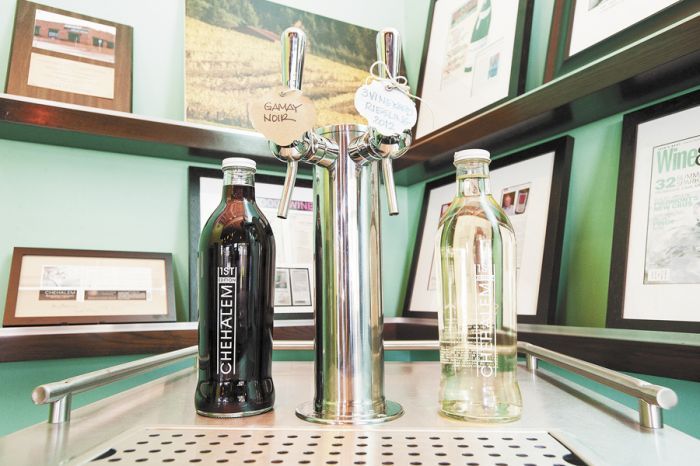Wine Bills Pass: Growlers allowed, non-wine rural events limited

Oregon House Bill 2443
By Mark Stock
House Bill 2443 breezed through Salem without so much as a single hang-up. The Oregon Legislature unanimously backed the so-called “Growler Bill,” allowing businesses with OLCC licenses — namely wineries and tasting rooms — to fill vessels up to two gallons in volume with the state’s fastest growing fermented beverages.
Environmentalists and many in the viticultural and enological realms, however, say this right is long overdue. The energy usage in glass manufacturing is a large part of the wine business. The carbon footprint left by the process is sizable, and it is estimated — especially outside the relatively green Beaver State — that the majority of wine bottles end up in landfills. Those recycled are done so with considerable resources needed to break down the used glass and turn it into something reusable.
Both tradition and progress have been pivotal characters in American wine. With the growler movement, the idea is to send someone away with a freshly filled container of wine for consumption later that day. Carey Kienitz, winemaker at Springhouse Cellar in Hood River, knows the scenario well. His label sells roughly half its annual production as one-liter refillable containers; that amounts to roughly 1,500 cases worth of wine a year.
“Our business model is focused on serving our local population,” said Kienitz. He quickly admits the winery can’t afford much talked-about and still expensive technology such as solar panels or gray-water recycling. Instead, Springhouse makes green maneuvers where it can, such as gravity-flow winemaking, fining with egg whites, even cold stabilizing in the snow (as opposed to a refrigerated unit).
Kienitz concedes the new legislation doesn’t affect Springhouse too directly. “It might improve public opinion of wine in refillable bottles,” he said. “For us, it has been a matter of overcoming some people’s inherent wine snobbery and prejudice against the concept.” Springhouse has been filling and sealing TTB-approved bottles from their tasting room since 2007. Much like boxed and draft wine, Kienitz and others in the industry hope the recent legislation will introduce a new era of acceptance and popularity.
Other wineries, like Chehalem in Newberg, have been operating similarly, filling custom one-liter bottles with draft wine from the tasting room. Under the new legislation, patrons may provide their own vessels to fill. But, as Kineitz points out, citing Springhouse’s specially made containers, not any old jug will do. His swing-top containers — a style made famous by Grolsch beer — are secure and can handle carbonation. While most people will be drinking these wines on the day of the fill, these containers, if stored properly, will keep the wine for a few weeks’ time.
The growler idea is quite European. For centuries, the French, as an example, have visited local wine purveyors for fresh wine, vessels in hand. Italians are known to frequent local cantinas or supermarkets to fill jugs with cheap and plentiful table wine. And in the States (especially the Northwest), we’re all aware of what the breweries have been able to offer for years.
Oregon is the first state to pass such wine-specific legislation. Others, like Maryland and Virginia, are exploring similar laws, and surely more will follow. Which begs the question: What’s next?
Draft wine has been on the rise for some time in Oregon, with every full-size keg estimated to be saving close to 80 glass bottles. Boxed wine works much the same way, albeit on a smaller scale and often in the company of plastic. Corks are sustainable in theory, but prone to shortages and cost spikes depending on conditions in Portugal, Spain and elsewhere.
Accessibility is key under the new legislation. People can fill growlers with their favorite Pinot Noir in restaurants and grocery stores equipped to do so. Expect more tasting room scenarios at your local supermarket and wine-centric eateries to offer to-go vessels of their own. Outfits like New Seasons have been ahead of the curve from the outset, offering draft wine and beer at some of their stores. What is likely just a few years away now — assuming similar legislation passes in other states — is for big retailers like Total Wine to offer some type of wine growler program.
Locally grown and processed wood for barrels, new site-specific clones and fully recyclable kegs are already being discussed in the industry. Whatever’s next, sustainability will no doubt play a big role. But if it’s growler wine you’re drinking while you’re waiting, make sure you do so sooner rather than later, for the wine’s sake.
Mark Stock, a Gonzaga grad, is a Portland-based freelance writer and photographer with a knack for all things Oregon. He currently works at Vista Hills Winery.
Oregon Senate Bill 841
By Janet Eastman
Don’t print those wedding or party invitations just yet if you’re hoping to hold the event at a winery in the Oregon countryside. A bill limiting the number of non-wine events on farmland passed the state Senate in April and the House in mid-June.
The bill, SB 841, was initiated at the request of the Oregon Winegrowers Association (OWA) and farmers concerned that vineyards are being turned into event centers instead of tasting rooms where activities are focused on selling wine made from grapes grown on the property.
Wineries in the Willamette Valley would be required to obtain an over-the-counter administrative license for the first six events, and a streamlined land-use permit authorizing the next 12 events — neighbors or nearby wineries could appeal the decision. Wineries wishing to conduct more than 18 events per year can do so under a conditional-use permit. Wineries outside the Willamette Valley would be authorized to conduct up to 18 events per year under the administrative license.
Proposed restrictions are tighter in the Willamette Valley, where the majority of the state’s 400 wineries are located. Most Northern Oregon wineries operate on smaller tracts than in Southern Oregon, leading to higher density and traffic.
The bill aims to balance the pull to protect farmland with wineries’ push to make money, says Michael Donovan of the OWA and Oregon Wine Board.
“Wineries need to have the right tools to be successful, but we should be farming grapes,” he says. “That’s why we were given the rights to operate a winery on [agricultural] land.”
Tasting rooms have no limits on the number of wine-related or wine-marketing activities, including wine tastings, wine club gatherings, winemaker meals, winery and vineyard tours, staff events and open houses, and business meetings with suppliers, distributors, wholesale customers and wine industry members.
Dan Marca, who opened his DANCIN Vineyards outside of Jacksonville a year ago, says the bill does not impact his operation.
“Our events are not an integral part of our business,” he says. “We are all about showcasing the wines that we produce in a unique, relaxed setting among the vines, as well as sharing the beauty and diversity of the Rogue Valley growing region.”
He declined a request from a wine-club member to rent his faculty for a wedding with 175 guests.
“That’s not what we do,” says Marca.
Scott Steingraber, the owner of Kriselle Cellars who opened a tasting room last year in White City, says he is torn about the bill. He approved the legislation as a member of the Southern Oregon Winery Association.
“I believe the OWA did a very good job in determining this current position,” he says. “But as a business owner, I do not believe it is in the best interest of the state or the wineries in Southern Oregon to reduce and limit private events.” Steingraber says most of the state’s wineries are small businesses with narrow profit margins and holding private events adds to the bottom line.
“These provide additional tax revenues and create jobs that are important to our economy,” he says. “By limiting the number of events, the proposed law will take away a bit of the ability for small wineries to continue to contribute to a healthy wine industry.”
At Kriselle Cellars, Steingraber says the focus is on sales and promotion of wine. But he also receives requests from customers, neighbors and colleagues to hold private receptions, retirement parties and business meetings.
“Some of our customers will walk away disappointed due to the additional regulation,” he says.
At the new Belle Fiore Estate & Winery in Ashland, a 19,000-square-foot chateau was built to be used as a private residence and public space for wine events and weddings. Below the chateau is a 20,000-square-foot winery with a ground-floor tasting room and upstairs ballroom.
According to the website, www.belle
fiorewine.com, the 52-acre property off Dead Indian Memorial Road can accommodate wedding parties and private events for 200 people. The law allows for local governments to approve events beyond the 18 permitted.
Steingraber hopes Jackson County officials are prepared for additional requests for permitted use without placing burdens on the wineries.
At a Rogue Valley Winegrowers Association meeting in January, Patrick Flannery of the year-old Dana Campbell Vineyards in Ashland heard that neighbor complaints to county officials could trigger an investigation into the number of non-wine events.
Flannery and his wife, Paula Brown, planted grapes in 2006 and opened a tasting room on their 32-acre property last year. Although they do not plan to have non-wine events or elaborate food service, he says, he and Brown have operated under the old rule of keeping neighbors happy.
“Now, we would have to fill out a form,” he says.












